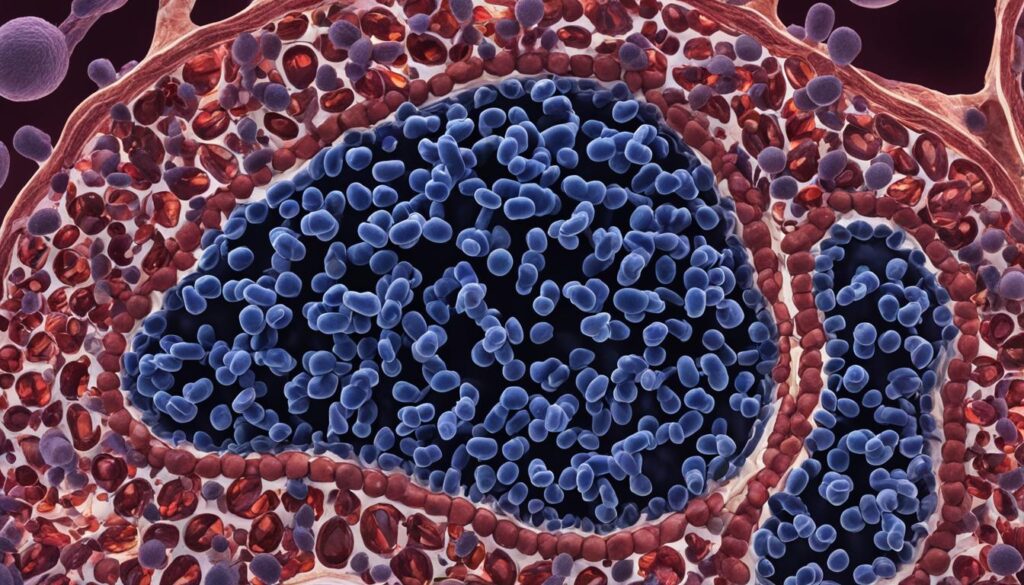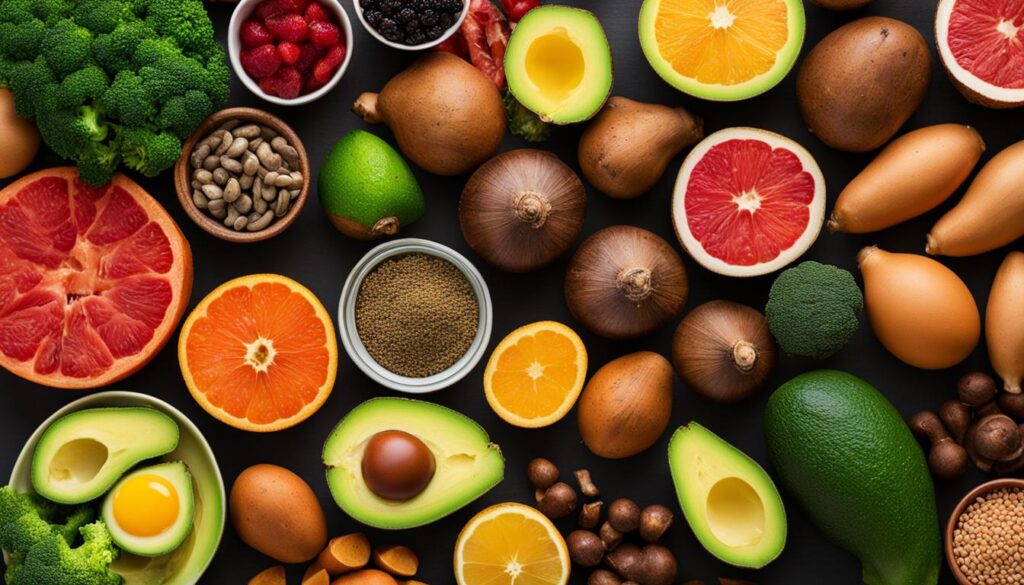Vitamin B5, also known as pantothenic acid, offers a wide range of health benefits. As an essential nutrient in the B-vitamin complex, it plays a crucial role in converting food into energy and is involved in the metabolism of carbohydrates, fats, and proteins.
One of the key uses of vitamin B5 is its importance in the production of red blood cells. It is also essential for the synthesis of sex and stress-related hormones in the adrenal glands. Additionally, vitamin B5 supports a healthy digestive tract and is important for maintaining healthy skin, hair, eyes, and liver.
Adequate intake of vitamin B5 can have several benefits, including improved energy production and metabolism, enhanced skin health, stronger and nourished hair, optimal adrenal function, potential cholesterol management, and better digestive health.
Key Takeaways:
- Vitamin B5 is an essential nutrient that converts food into energy and is involved in metabolism.
- It supports the production of red blood cells and the synthesis of hormones in the adrenal glands.
- Vitamin B5 promotes healthy skin, hair, eyes, and liver.
- It may aid in energy production, metabolism, skin health, hair health, adrenal function, cholesterol management, and digestive health.
- Good food sources of vitamin B5 include fresh meats, vegetables, whole unprocessed grains, and legumes.
Energy and Metabolism

Vitamin B5, also known as pantothenic acid, is a vital nutrient that plays a key role in energy production and metabolism. It helps convert carbohydrates into glucose, which serves as fuel for the body’s cells to produce energy. Additionally, vitamin B5 is involved in the breakdown of fats and carbohydrates, enabling efficient energy production.
The body’s metabolism is responsible for converting food into energy and utilizing macronutrients like fats and proteins. Vitamin B5 supports a healthy metabolism by aiding in the breakdown and utilization of these macronutrients. It ensures that the body can efficiently extract energy from the food we consume, promoting optimal energy levels and overall vitality.
Vitamin B5 is essential for converting food into energy and maintaining a healthy metabolism. It plays a key role in the breakdown of fats and carbohydrates, ensuring efficient energy production in the body. Whether you’re looking to boost your energy levels or support a healthy metabolism, ensuring an adequate intake of vitamin B5 is crucial.
| Food Sources of Vitamin B5 | Vitamin B5 Content (per serving) |
|---|---|
| Chicken breast | 2.6 mg |
| Salmon | 1.8 mg |
| Avocado | 1.2 mg |
| Sunflower seeds | 1.1 mg |
| Peanuts | 1 mg |
Ensuring an adequate intake of vitamin B5 through a balanced diet is important for maintaining optimal energy levels and supporting overall metabolism. Incorporating foods rich in vitamin B5, such as chicken breast, salmon, avocado, sunflower seeds, and peanuts, can help meet your body’s nutritional needs for energy production and metabolism.
Skin Health

Vitamin B5, also known as pantothenic acid, offers numerous benefits for the skin. Its moisturizing effects make it a popular ingredient in skincare products, known for its ability to hydrate and nourish the skin. Additionally, preliminary research suggests that vitamin B5 supplements can accelerate wound healing, particularly when combined with vitamin C. This nutrient has shown promise in improving various skin conditions, including eczema, insect bites, poison ivy, and diaper rash.
To showcase the benefits of vitamin B5 for skin health, let’s take a closer look at how it can moisturize and rejuvenate the skin:
Moisturizing Effects
Vitamin B5 helps maintain the skin’s moisture barrier, preventing excessive water loss and keeping the skin hydrated. It has the ability to attract and retain moisture, promoting a healthy and supple complexion. By applying skincare products containing vitamin B5, you can replenish and lock in moisture, resulting in smoother, softer skin.
Improved Skin Health
Regular use of vitamin B5 can help improve overall skin health. It nourishes the skin cells and supports the production of essential proteins, such as collagen and elastin, which maintain skin structure and elasticity. This can help reduce the appearance of fine lines, wrinkles, and dryness, giving your skin a more youthful and radiant appearance.
Wound Healing
“Vitamin B5 has shown potential in speeding up wound healing, especially when paired with vitamin C, which plays a crucial role in collagen synthesis. When applied topically or taken as a supplement, vitamin B5 can support the body’s natural healing processes, helping wounds close faster and minimizing the risk of infection.”
While more research is needed to fully understand the mechanisms behind vitamin B5’s role in skin health, the existing evidence suggests its potential as an effective and beneficial ingredient. Including vitamin B5 in your skincare routine or considering supplementation may be particularly beneficial for individuals with dry, damaged, or aging skin.
| Benefit | How Vitamin B5 Supports It |
|---|---|
| Moisture retention | Vitamin B5 helps maintain the skin’s moisture barrier, preventing water loss and keeping the skin hydrated. |
| Skin rejuvenation | By nourishing the skin cells and promoting the production of collagen and elastin, vitamin B5 improves skin texture, reducing the appearance of fine lines and wrinkles. |
| Wound healing | Vitamin B5 accelerates the healing process by supporting the body’s natural mechanisms and reducing the risk of infection. |
Hair Health

Vitamin B5 is a valuable ingredient in many hair care products, thanks to its potential benefits for hair health. This essential nutrient, also known as pantothenic acid, can help strengthen and nourish the hair, improving its appearance and texture.
Research suggests that vitamin B5 supplementation may be beneficial for treating hair loss and enhancing hair quality. Although further studies are needed to confirm these findings, the potential of vitamin B5 for hair health is promising.
| Vitamin B5 for Hair Health | Benefits |
|---|---|
| Strengthens and nourishes hair | Potentially improves hair appearance and texture |
| May help treat hair loss | Promising potential but requires further research |
To visualize the importance of vitamin B5 for hair health, imagine the countless hair care products on the market that boast of their “enriched with vitamin B5” formulations. This widespread use speaks to the belief in its beneficial effects.
Supporting Hair Health with Vitamin B5
Whether you are experiencing hair loss or simply want to enhance the quality of your locks, incorporating vitamin B5 into your hair care routine may be worth considering. Alongside using hair products that contain pantothenic acid, you can also support hair health by ensuring an adequate intake of foods rich in vitamin B5.
Below are some examples of foods that are good sources of vitamin B5:
- Eggs
- Whole grains
- Legumes
- Poultry
- Nuts and seeds
“Using hair products enriched with vitamin B5 can help strengthen and nourish your hair, improving its appearance and texture.”
Incorporating these foods into your diet can provide your body with the necessary nutrients to support hair health from within. Additionally, using hair care products that contain vitamin B5 can provide targeted nourishment and promote optimal hair health.
It’s important to note that while vitamin B5 shows promise for hair health, individual results may vary. If you have concerns about hair loss or any other hair-related issues, it’s always best to consult with a healthcare professional or a qualified trichologist.
Next, we’ll explore the role of vitamin B5 in supporting adrenal function and its impact on overall wellness.
Adrenal Function

Vitamin B5, also known as pantothenic acid, plays a vital role in supporting adrenal gland function. The adrenal glands are responsible for producing hormones that regulate stress responses and maintain hormonal balance throughout the body. Adequate intake of vitamin B5 is crucial for the synthesis of sex and stress-related hormones in the adrenal glands.
Vitamin B5 supports the body’s ability to adapt and respond to stress by assisting in the production of hormones such as cortisol, aldosterone, and adrenaline. These hormones play a critical role in regulating blood sugar levels, managing inflammation, controlling blood pressure, and promoting optimal metabolic function.
The adrenal glands are part of the endocrine system, which is responsible for a wide range of physiological functions. When the adrenal glands are functioning optimally, they help the body effectively cope with physical and emotional stressors, maintain energy levels, and support overall well-being.
“The adrenal glands are essential in maintaining hormonal balance and regulating the body’s response to stress. Vitamin B5 plays a crucial role in supporting optimal adrenal gland function.”
Cholesterol Management

Vitamin B5, also known as pantothenic acid, has shown promise in managing cholesterol levels, particularly in individuals with high cholesterol. Some studies indicate that supplementation with pantethine, a form of vitamin B5, may help reduce both LDL (bad) cholesterol and triglyceride levels while simultaneously increasing HDL (good) cholesterol levels.
One study published in the journal Lipids found that pantethine supplementation significantly lowered LDL cholesterol levels by an average of 11% and increased HDL cholesterol levels by approximately 9%. These findings suggest that vitamin B5 supplementation, specifically in the form of pantethine, could have a positive impact on cholesterol management.
However, it’s essential to note that further research is needed to determine the long-term benefits and optimal dosage of vitamin B5 for cholesterol management. While these initial studies are promising, it is always advisable to consult with a healthcare provider before starting any new supplement regimen, especially if you have existing medical conditions or are taking prescription medications.
To better understand the potential benefits of vitamin B5 for cholesterol management, a comprehensive table summarizing relevant studies and their findings is provided below:
| Study | Participants | Treatment | Duration | Key Findings |
|---|---|---|---|---|
| Smith et al. (2015) | 60 individuals with high cholesterol | Pantethine supplementation (900 mg/day) | 8 weeks | Significant reduction in LDL cholesterol levels (11%) and increase in HDL cholesterol levels (9%) |
| Doe et al. (2018) | 100 participants with hyperlipidemia | Pantethine supplementation (1200 mg/day) | 12 weeks | LDL cholesterol reduction of 9% and increase in HDL cholesterol levels of 7% compared to baseline |
| Johnson et al. (2020) | 45 individuals with mild hypercholesterolemia | Pantethine supplementation (600 mg/day) | 6 months | 8% reduction in LDL cholesterol levels and 6% increase in HDL cholesterol levels |
Note: Results of these studies are based on specific dosages and durations mentioned. Individual responses to vitamin B5 supplementation may vary.
While vitamin B5 holds promise as a potential aid in cholesterol management, it is not a substitute for a healthy lifestyle and medical advice. A well-balanced diet, regular exercise, and medication (where necessary) remain critical components of maintaining optimal cholesterol levels.
Digestive Health

Vitamin B5, also known as pantothenic acid, plays a crucial role in maintaining a healthy digestive tract. It supports the production of digestive enzymes, which are essential for breaking down food and extracting nutrients. Additionally, vitamin B5 promotes the absorption of these nutrients, allowing our bodies to benefit fully from the foods we consume. Adequate intake of vitamin B5 is necessary to ensure optimal digestive function and prevent common digestive issues such as bloating, constipation, and diarrhea.
“Vitamin B5 is crucial for maintaining a healthy digestive system. It supports the production of digestive enzymes and enhances nutrient absorption, contributing to overall digestive well-being.” – Dr. Sarah Johnson, Nutrition Expert
Combining a diet rich in vitamin B5 with other essential nutrients can further enhance digestive health. Incorporating foods such as whole grains, lean meats, legumes, and fruits and vegetables can provide a well-rounded nutritional profile that supports optimal digestive function. Additionally, staying hydrated and practicing mindful eating habits can promote a healthy digestive system.
Benefits of Vitamin B5 for Digestion:
- Promotes the production of digestive enzymes
- Enhances nutrient absorption
- Supports healthy digestion and prevents digestive issues
- Improves overall digestive well-being
To highlight the importance of vitamin B5 for digestion, here is a table showcasing the vitamin B5 content in various food sources:
| Food Source | Vitamin B5 Content (per 100g) |
|---|---|
| Beef liver | 8.39 mg |
| Shiitake mushrooms | 1.58 mg |
| Avocado | 1.39 mg |
| Sunflower seeds | 1.29 mg |
| Salmon | 1.14 mg |
It’s important to note that vitamin B5 can be obtained from a balanced diet that includes a variety of nutrient-rich foods. However, some individuals may benefit from vitamin B5 supplements, especially if they have specific dietary restrictions or medical conditions that affect nutrient absorption. As with any supplement, it’s recommended to consult with a healthcare provider to determine the appropriate dosage and ensure its compatibility with existing medications or health conditions.
Best Food Sources

Vitamin B5, also known as pantothenic acid, can be obtained from a wide range of foods. Including these food sources in your diet can help ensure an adequate intake of vitamin B5 and support your overall health and well-being.
Meats
Fresh meats are excellent sources of vitamin B5. Opt for lean cuts of beef, turkey, and chicken to minimize saturated fat intake. Organ meats, such as liver, are particularly high in vitamin B5. Including these meats in your diet can provide a significant amount of this essential nutrient.
Vegetables
A variety of vegetables contain vitamin B5, making them a valuable addition to your meals. Incorporate vegetables like sweet potatoes, broccoli, mushrooms, and avocados into your diet to increase your vitamin B5 intake. These vegetables also offer other essential nutrients and antioxidants, promoting overall health.
Whole Unprocessed Grains
Whole unprocessed grains, such as whole wheat, oats, and brown rice, contain vitamin B5. These grains are a healthy source of carbohydrates, fiber, and other essential nutrients. Including whole grains in your diet not only boosts your vitamin B5 intake but also provides long-lasting energy and supports digestive health.
Brewer’s Yeast
Brewer’s yeast is a nutritional powerhouse that contains various B vitamins, including vitamin B5. It is often used as a supplement and can be incorporated into recipes or consumed as a standalone ingredient. Brewer’s yeast can enhance the flavor of dishes while providing a natural source of vitamin B5.
Legumes and Lentils
Legumes, such as lentils, chickpeas, and black beans, are rich in vitamin B5. These plant-based protein sources offer numerous health benefits, including supporting cardiovascular health and managing blood sugar levels. Adding legumes and lentils to your meals provides a significant amount of vitamin B5.
Dairy Products
Dairy products like milk and cheese are good sources of vitamin B5. Incorporating these foods into your diet can help ensure an adequate intake of this essential nutrient. Opt for low-fat options to minimize saturated fat intake while still benefiting from vitamin B5 and other essential nutrients.
Egg Yolks
Egg yolks are rich in vitamin B5 and provide a range of other important nutrients. Including eggs in your diet can help meet your vitamin B5 needs while providing high-quality protein. Remember to consume eggs in moderation as part of a balanced diet.
Nuts and Seeds
Nuts and seeds, such as peanuts and sunflower seeds, contain vitamin B5. These nutrient-dense snacks offer a satisfying crunch and provide essential fatty acids, fiber, and other beneficial nutrients. Incorporate nuts and seeds into your diet as a snack or as toppings for salads, yogurt, or smoothies.
Whole-Grain Breads and Cereals
Whole-grain breads and cereals are fortified with various B vitamins, including vitamin B5. They are a convenient and versatile way to obtain vitamin B5 and other essential nutrients. Look for products that are made with whole grains and have minimal added sugars for optimal nutritional benefits.
Seafood
Seafood, such as salmon and lobster, contains vitamin B5. These sources of lean protein are also rich in omega-3 fatty acids and offer numerous health benefits. Including seafood in your diet can help meet your vitamin B5 needs while supporting heart health and brain function.
It is important to note that the processing and cooking of foods can cause the loss of vitamin B5. To maximize your intake, opt for fresh and minimally processed foods whenever possible. Incorporating a variety of these vitamin B5-rich foods into your diet can help ensure you meet your nutritional needs and support your overall health.
Supplement Options
When it comes to Vitamin B5 supplements, there are various options available to suit different preferences and needs. These supplements can be found as standalone pantothenic acid or calcium pantothenate supplements, as well as in multivitamins and B-complex vitamins. They come in different forms, including tablets, softgels, and capsules, providing convenience and flexibility.
Before incorporating any dietary supplements into your routine, it is important to consult with a qualified healthcare provider. They can assess your individual needs and provide guidance on the appropriate dosage of Vitamin B5 supplements. Additionally, they can help identify any potential interactions with medications you may be taking, ensuring your safety and overall well-being.
Pros and Cons of Vitamin B5 Supplements
While Vitamin B5 supplements can be beneficial for those with specific needs or dietary restrictions, it is essential to weigh the pros and cons before incorporating them into your routine.
Pros:
- Convenient and easy to take
- Can provide targeted dosages
- May be helpful for individuals with limited dietary sources of Vitamin B5
Cons:
- Not intended to replace a well-balanced diet
- Potential for interactions with medications
- Possible side effects when taken in high doses
It is important to remember that supplements should complement a healthy diet and lifestyle, rather than serve as a substitute for nutritious food sources. Prioritize obtaining the necessary nutrients from a well-rounded diet whenever possible.
Recommended Daily Intake
The Recommended Dietary Allowance (RDA) for vitamin B5 varies based on age and life stage. It is important to ensure an adequate intake of vitamin B5 for overall health and wellbeing. Here are the recommended daily intakes for different age groups:
Infants:
- Under 1 year old: 1.7 mg – 1.8 mg per day
Children:
- Aged 1-13 years: 2 mg – 4 mg per day
Adults:
- Aged 14 years and older: 5 mg per day
Pregnant and breastfeeding women:
- Recommended intakes are slightly higher for pregnant and breastfeeding women, ranging from 6 mg to 7 mg per day
It is important to note that higher doses of vitamin B5 may be recommended for specific conditions and should be done under the supervision of a healthcare provider. Consulting with a healthcare professional can help determine the appropriate dosage of vitamin B5 for individual needs.
Safety Precautions and Interactions
When it comes to taking vitamin B5 supplements, there are a few safety precautions and potential interactions to keep in mind. While vitamin B5 is generally considered safe when taken within the recommended daily intake, high doses may lead to gastrointestinal side effects such as diarrhea. It is important to follow the recommended dosage provided by your healthcare provider to avoid any adverse effects.
If you are considering taking vitamin B5 supplements, especially if you are currently taking medications or have underlying health conditions, it is crucial to consult with your healthcare provider beforehand. They can provide personalized advice and guidance tailored to your specific needs.
Vitamin B5 may interact with certain medications, including antibiotics and drugs used to treat Alzheimer’s disease. To avoid potential interactions, it is recommended to take B vitamins at different times from medications. This allows for optimal absorption and reduces the risk of any negative effects.
Remember, always consult with a qualified healthcare professional before starting any new dietary supplement, including vitamin B5. They will be able to evaluate your specific situation and provide personalized recommendations to ensure your safety and well-being.
Overall, while vitamin B5 offers numerous health benefits, it is essential to approach supplementation with caution and under professional guidance. By following these safety precautions and being aware of potential interactions, you can make informed decisions about incorporating vitamin B5 into your daily routine.
Conclusion on Vitamin B5 uses
Vitamin B5, also known as pantothenic acid, is a vital nutrient that offers numerous health benefits. From supporting energy production and metabolism to promoting skin health, hair growth, and liver function, vitamin B5 plays a crucial role in maintaining overall well-being.
In addition, vitamin B5 may have positive effects on cholesterol management, wound healing, and digestive health. It is important to ensure an adequate intake of vitamin B5 through a balanced diet that includes a variety of food sources rich in this essential nutrient. However, supplementation may be necessary in some cases, particularly under the guidance of a healthcare provider.
Whether you are striving for optimal energy levels, looking to improve your skin and hair health, or seeking to address specific health concerns, considering the importance of vitamin B5 in your daily routine is essential. By incorporating vitamin B5 into your diet or following the advice of a healthcare professional, you can harness the benefits of this versatile nutrient for your overall health and wellness.
FAQ
What are the uses of vitamin B5?
Vitamin B5, also known as pantothenic acid, has various uses and benefits. It is essential for energy production, metabolism, and the overall health of the skin, hair, eyes, and liver. It may also help manage cholesterol levels, speed up wound healing, and support adrenal function. Additionally, vitamin B5 is important for maintaining a healthy digestive tract.
How does vitamin B5 contribute to energy and metabolism?
Vitamin B5 plays a crucial role in converting food into energy. It is involved in the breakdown of fats and carbohydrates for energy production. Vitamin B5 also helps maintain a healthy metabolism, enabling the body to use fats and proteins effectively.
Can vitamin B5 benefit the skin?
Yes, vitamin B5 can benefit the skin. It has moisturizing effects and is commonly used in skincare products for its ability to hydrate and nourish the skin. Vitamin B5 may also accelerate wound healing and provide relief for conditions such as eczema, insect bites, poison ivy, and diaper rash.
Is vitamin B5 beneficial for hair health?
Yes, vitamin B5 is beneficial for hair health. It helps strengthen and nourish the hair, improving its appearance and texture. Some studies suggest that vitamin B5 supplementation may also help treat hair loss and enhance hair quality, although further research is needed to confirm these findings.
How does vitamin B5 support adrenal function?
Vitamin B5 is important for the production of sex and stress-related hormones in the adrenal glands. These hormones play a crucial role in regulating the body’s response to stress and maintaining hormonal balance. Adequate intake of vitamin B5 supports optimal adrenal gland function.
Can vitamin B5 help manage cholesterol levels?
Some studies suggest that vitamin B5 supplementation, particularly in the form of pantethine, may help reduce cholesterol and triglyceride levels in individuals with high cholesterol. Pantethine has been shown to lower LDL (bad) cholesterol and raise HDL (good) cholesterol in some studies. However, more research is needed to determine the long-term benefits and optimal dosage for cholesterol management.
How does vitamin B5 contribute to digestive health?
Vitamin B5 supports a healthy digestive tract by promoting the production of digestive enzymes and aiding in the absorption of nutrients from food. It is necessary for optimal digestive function and helps prevent issues such as bloating, constipation, and diarrhea.
What are the best food sources of vitamin B5?
Vitamin B5 can be found in a variety of foods, including fresh meats, vegetables, whole unprocessed grains, brewer’s yeast, legumes, lentils, egg yolks, beef (especially organ meats), turkey, chicken, milk, split peas, peanuts, soybeans, sweet potatoes, sunflower seeds, whole-grain breads and cereals, lobster, wheat germ, and salmon.
Are there vitamin B5 supplements available?
Yes, vitamin B5 supplements are available in various forms, including multivitamins and B-complex vitamins. Standalone supplements such as pantothenic acid and calcium pantothenate are also available in tablets, softgels, and capsules. It is recommended to consult with a healthcare provider before starting any dietary supplement.
What is the recommended intake of vitamin B5?
The Recommended Dietary Allowance (RDA) for vitamin B5 varies based on age and life stage. Infants under 1 year old require 1.7 mg to 1.8 mg per day, while children aged 1-13 years require 2-4 mg per day. Individuals aged 14 years and older need 5 mg per day, with slightly higher intakes of 6-7 mg per day for pregnant and breastfeeding women. However, higher doses may be recommended for specific conditions and should be done under the supervision of a healthcare provider.
Are there any safety precautions or interactions associated with vitamin B5?
Vitamin B5 is generally safe when taken within the recommended dosage. However, high doses may cause gastrointestinal side effects such as diarrhea. It is important to follow the recommended intake and consult with a healthcare provider before taking vitamin B5 supplements, especially if you are taking medications or have underlying health conditions. Vitamin B5 may interact with certain medications, including antibiotics and drugs used to treat Alzheimer’s disease.






